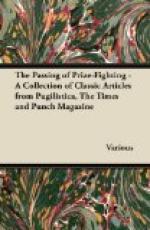I Was aware that Mr. J. was a semolina-brained impostor, but I should never have conceived that even he, the jelly-faced chief of the chowder-heads, could have attained to such a pitch of folly as to inform me that “the Prix Montyon is not a medal, and cannot be worn at Court.” These are his words. Did I ever say it was a medal? I remarked that the QUEEN had given me permission to wear it at Court. That is true. But I never said that I would or could so wear it. As for Her Most Gracious Majesty’s permission, it was conveyed to me in a document beginning, “VICTORIA, by the grace of,” &c, and containing the signature of Lord HALSBURY, the Lord Chancellor—No, by the way, that is another Royal communication. The Permission begins, “To our right trusty and well-beloved.” What beautiful, confiding, affectionate words are these! Who can wonder that a Queen who habitually makes use of them should reign in the hearts of her subjects?
Since I returned from France I have been on a further and more extensive Continental tour, and have received more marks of distinction from various Crowned Heads. Did you hear the strange story of what took place at the meeting of the German EMPEROR with the CZAR of Russia? It was the hour of the mid-day meal. The EMPEROR, at the head of his Wyborg Regiment, had performed prodigies of valour. Mounted on his fiery Tchinovick (a Circassian mustang) he had ridden into the heart of the hostile position, and with one stroke of his Pen (a sort of Russian scimetar with a jewelled hilt) he had captured a convoy containing three thousand Versts (a sort of condensed food), intended for the consumption of the opposing Army. Tired with his labours, he was now lying at full length beside his Imperial host on the banks of the torrential Narva. The CZAR, in attempting to open, a Champagne bottle, had just broken one of his Imperial nails, and had despatched his chief butler to Siberia, observing with pleasant irony, that he would no doubt find a corkscrew there. At this moment a tall and aristocratic stranger, mounted upon a high-spirited native Mokeoffskaia, dashed up at full gallop. To announce himself as Lieutenant-General POPOFF, to seize the refractory bottle, to draw the cork, and pour the foaming liquid into the Imperial glasses, was for him the work of a moment. That stranger was I. In recognition of my promptitude, the CZAR has conferred upon me the Stewardship of the Vistula Hundreds, with the command of a division of the Yeomanoff Cavalry, the most distinguished horse-soldiers in Europe.
The German EMPEROR was equally impressed. His Majesty smiled, and, turning to General CAPRIVI, told him to consider himself henceforth under my orders for everything that concerned the peace of the world. I could see that CAPRIVI did not relish this, but I soon made him know his place, and when I threatened to send for Prince BISMARCK—who, by the way, has granted me the unique honour of an interview—he became quite calm and reasonable. On my way home, I called in on Prince FERDINAND of Bulgaria, who offered me his Crown, telling me at the same time that he intended to take a course of German Baths. He said I should find STAMBOULOFF a very pleasant fellow; “but,” he added, “you’ve got to know him first.”




